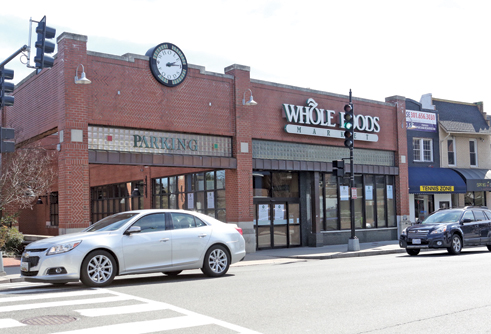Whole Foods Still Shut Amid Landlord Dispute

By Brady HoltCurrent Staff WriterGlover Park is still without its Whole Foods Market, with the grocery store remaining locked in a heated legal battle with its landlords.The 2323 Wisconsin Ave. NW store has been closed since March, after a D.C. Department of Health inspection found evidence of a persistent rodent infestation. Although the Health Department allowed Whole Foods to reopen, the company decided to voluntarily close and conduct more thorough remediation efforts.But Whole Foods needed the permission of its landlord, Wical Limited Partnership, to get building permits for its project — which Wical refused to provide. The landlord then sought to terminate Whole Foods’ lease, saying the store violated a ban on closing for more than 60 days at a time. Whole Foods sued Wical in June over the issue.At issue is what Whole Foods calls a contradictory lease, according to its filings in U.S. District Court. On the one hand, the store can’t be closed for more than 60 days at a time. But at the same time, the lease requires Whole Foods to “keep the property clean and free of pests and operate the store in accordance with the same standards of quality as it does in similar stores” — and the grocery chain says a full-scale renovation is required to meet that standard.To address its rodent issue, Whole Foods said, the only option was to gut the store and rebuild — a process that would also allow for a much-needed renovation that would bring the Glover Park location up to the standard of other modern Whole Foods stores. Then Wical stalled the work by refusing permission for Whole Foods to file for city building permits.“When Whole Foods was unable to thoroughly prevent the rodent problem through standard business means such as engaging a pest control service, it had no choice but to close the Store to ensure all steps would be taken to eradicate the rodents and conform to the Lease,” the grocery chain wrote in a Sept. 18 filing. Whole Foods alleges that Wical is simply trying to pressure it into accepting a higher lease rate, given that it’s already heavily invested in the Wisconsin Avenue building.Whole Foods is asking the court to protect its current lease; require Wical to consent to its building permit applications; grant Whole Foods damage payments; and give Whole Foods the right to terminate the lease in addition to receiving damages.Wical’s court filings paint a different picture. The landlord argues that Whole Foods closed down and even began its renovation work without seeking Wical’s permission as the property owner. Given that the demolition lacked permits, the District issued a stop-work order, which remains in effect.“Having created its own so-called ‘emergency’ by failing to maintain the Store and by failing to obtain permission from its landlord or the District before beginning large-scale alterations, Whole Foods rushes into this Court seeking an emergency order forcing Wical to consent to permit applications,” Wical contends. “Whole Foods, with all its resources and experience, has no excuse for the neglect that led to its health code violations, issuance of a Stop Work Order from the District government for failing to obtain the required construction permits, and failure to keep the premises up to the required standards.”Wical asked the court to dismiss the case last month — allowing it to proceed with terminating Whole Foods’ lease — and no decision has yet been made.Even before the lawsuit, Whole Foods declined to speculate to community members how long it would take for the supermarket to reopen. The store’s interior was already heavily demolished before the city’s stop-work order, and Whole Foods hasn’t yet even applied for permits to rebuild it due to Wical’s opposition.Wical and Whole Foods have declined to comment to The Current on the lawsuit, and a Whole Foods spokesperson didn’t respond to questions about how the company plans to serve the Glover Park/Georgetown community moving forward.Jackie Blumenthal, a Glover Park advisory neighborhood commissioner who used to shop regularly at Whole Foods, told The Current that residents aren’t pleased with the store’s handling of the situation.“The community is extremely unhappy and even upset that Whole Foods remains closed, is embroiled in a lawsuit, and refuses to comment about when — or if — it will reopen,” Blumenthal wrote in an email. “The inconvenience of Whole Food’s closing is one thing ... but given that our community has probably spent hundreds of thousands of dollars every year at Whole Foods, the lack of communication is arrogant and insulting.”
This article appears in the Sept. 27 issue of The Georgetown Current newspaper.
